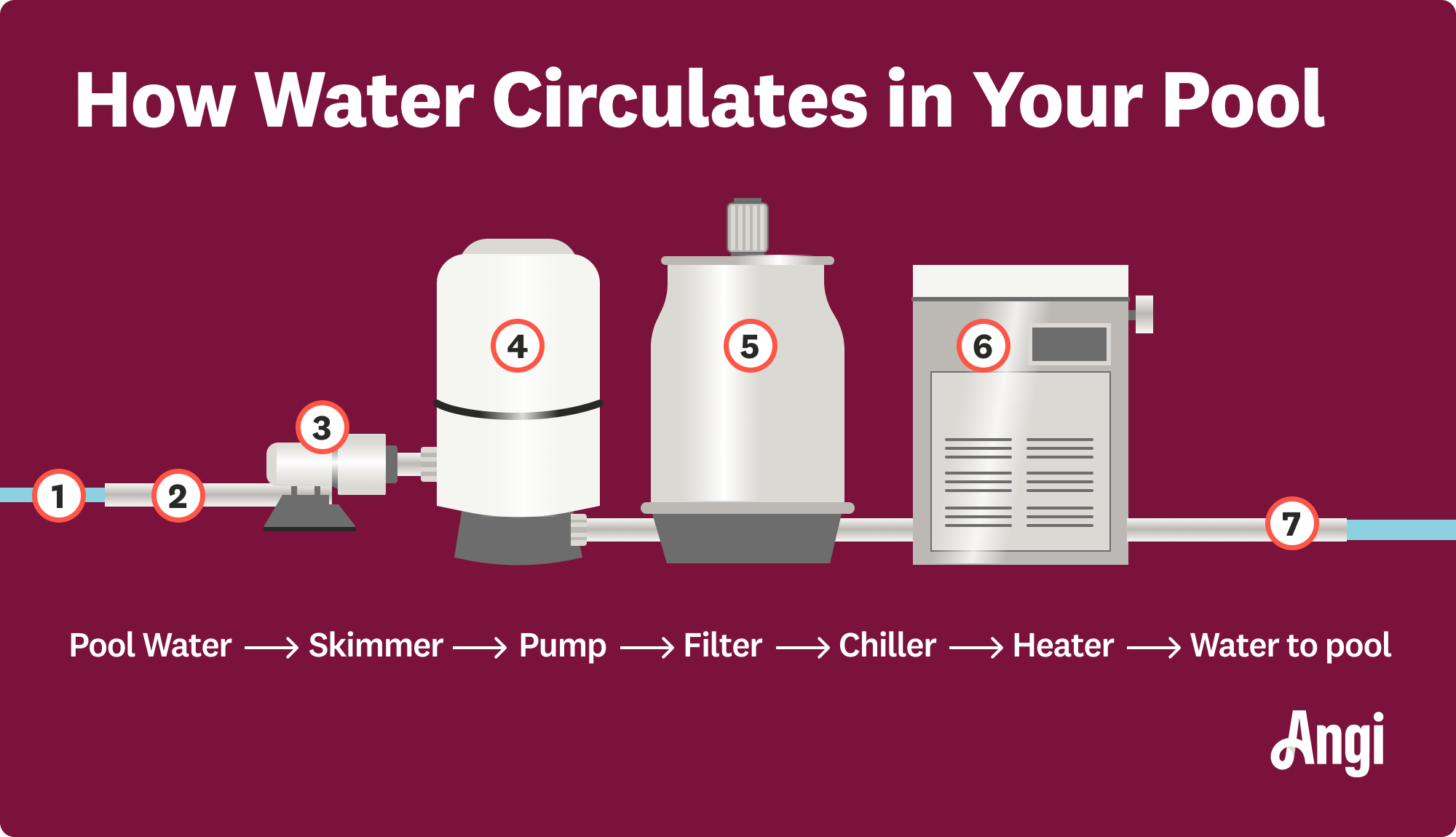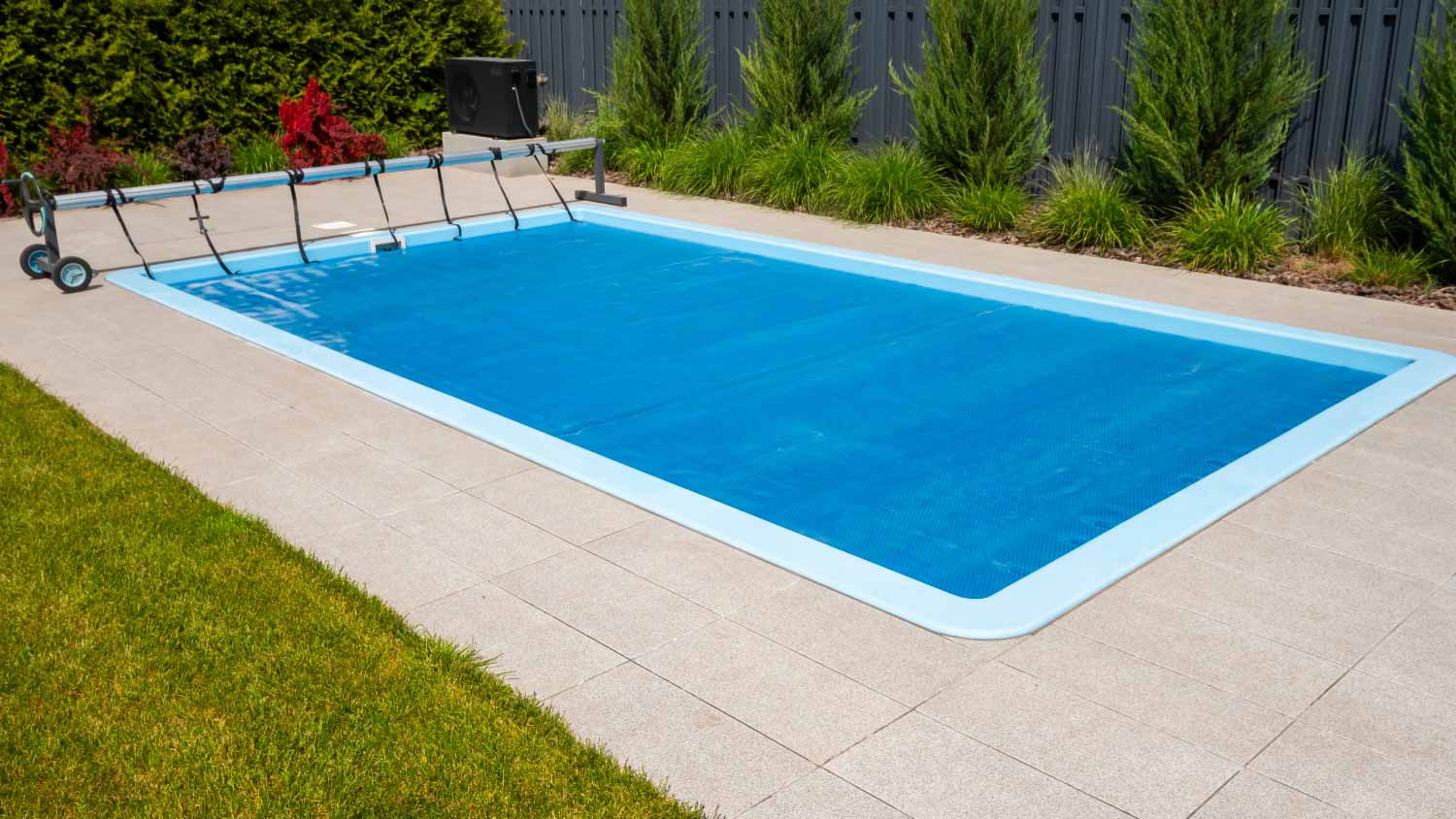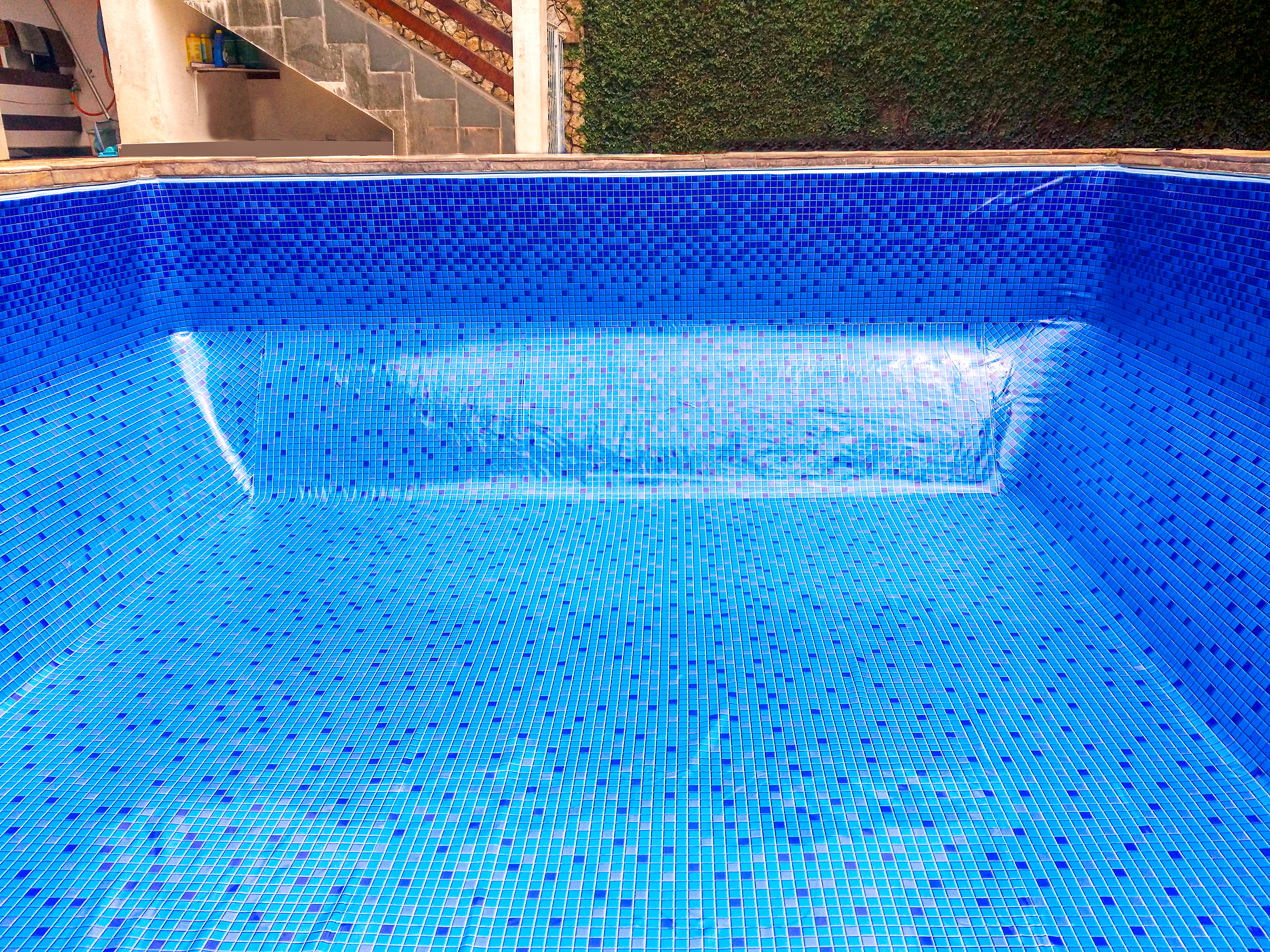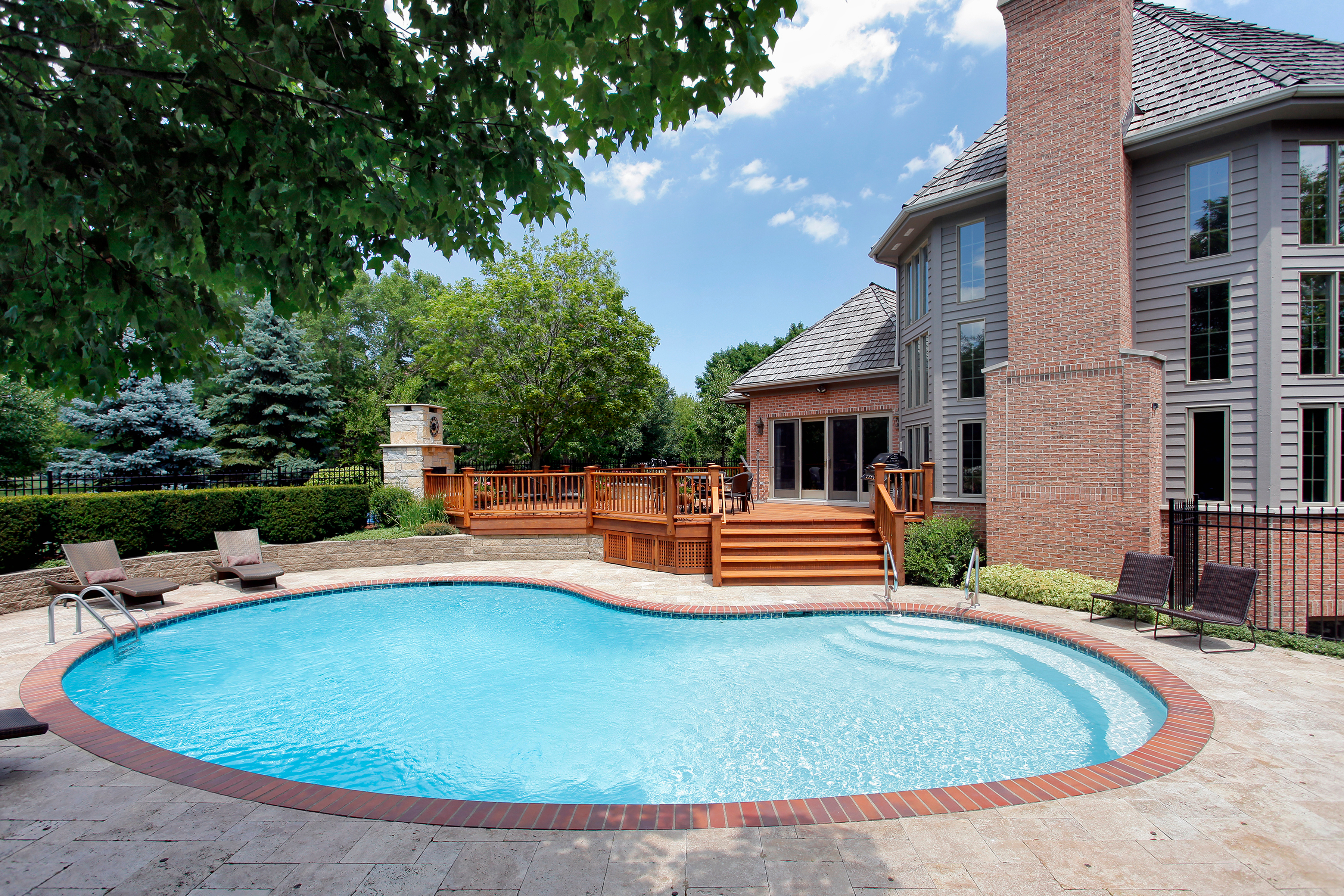
If you're ready to get rid of that pool once and for all, use this guide to learn aboveground pool removal cost based on factors like size, type, and features.
Pool construction and installation costs depend on your project and location. Check with a local pro for your specific job.
Pool chillers cost $2,000 to $6,500 for most homeowners, with a national average of $4,250.
Evaporative chillers cost $1,000 to $3,000, mechanical chillers cost $1,500 to $6,000, and hybrid units that also heat the pool cost $2,000 to $8,000.
Pool size heavily influences the price, with small pools costing $1,000 to $3,000 and large pools over 30,000 gallons costing $4,000 to $8,000.
Labor adds $500 to $1,500 for installation when billed as a flat rate, while hourly installation costs typically run $50 to $150 per hour depending on project complexity.
Ongoing operating costs vary widely, with electricity adding $10 to $300 per month and annual professional maintenance running $100 to $300.
There are two major costs associated with pool chiller installation: the cost of the pool chiller and the cost of labor. Here are some cost factors to consider.

There are three different types of pool chillers. Evaporative chillers are the most affordable but can be less effective than mechanical pool chillers. Meanwhile, hybrid chillers are the most costly but offer heating as well as cooling.
| Type of Pool Chiller | Cost Range (Chiller Only) |
|---|---|
| Evaporative | $1,000–$3,000 |
| Mechanical | $1,500–$6,000 |
| Hybrid | $2,000–$8,000 |
Evaporative Pool Chillers: Evaporative pool chillers cost $1,000–$3,000. They use a pump to pressurize water into a mist, then a fan to blow the mist over the pool's surface. The mist evaporates, absorbing the heat from the pool's surface in the process.
Mechanical Pool Chillers: Mechanical pool chillers cost $1,500–$6,000. They use refrigerant to cool water. These coolers are like air conditioning for your pool and work better than evaporative coolers in humid climates.
Hybrid Pool Chillers: Hybrid pool chillers cost $2,000–$8,000. They’re a combination of a chiller and a heat pump and can heat and cool your pool.
You’ll need to choose a pool chiller with the capacity to cool the volume of water in your pool. The larger your pool, the more the chiller will cost. The average residential pool holds 10,000 to 20,000 gallons of water, but commercial pools or large residential pools may hold more.
| Pool Size | Gallons | Average Cost Range |
|---|---|---|
| Small | Up to 15,000 | $1,000–$3,000 |
| Medium | 15,000–30,000 | $2,000–$4,000 |
| Large | More than 30,000 | $4,000–$8,000 |
There are various brands of pool chillers. A higher-end brand will cost more, though some manufacturers offer seasonal sales. The leading brands include Glacier Pool Coolers (which are among the most affordable) and AquaCal (which offer a range of chillers and hybrid chillers). You’ll also find GulfStream, FibroPool, and Raypak topping best of lists.
If you hire a pool contractor to install your pool chiller, you can expect to spend $500 to $1,500 on labor. Most pool contractors charge $50 to $150 per hour. The more complicated the installation, the more time it will take and the more it will cost.
| Labor for Pool Chiller Installation | Average Cost Range |
|---|---|
| Flat rate | $500–$1,500 |
| Hourly rate | $50 to $150 |
The cost of a pool chiller includes the installation and the chiller unit itself, as well as a couple of ongoing costs to consider.
Similar to a pool heater, a pool chiller runs on electricity. Running your new pool chiller will raise your electric bill. For most homeowners, the added electricity cost per month for a pool is somewhere between $10 and $300. The amount depends on the following factors:
Desired Temperature: The optimal temperature for a recreational swimming pool is between 78–86 degrees. The more you need to lower the temperature, the more it will cost to run the cooler.
Pool Size: It takes more energy to cool a larger pool with a higher volume of water.
Location: If you live in a hot and sunny climate, your pool may warm up quickly. As a result, your pool chiller will need to use more energy to maintain the optimal temperature.
Efficiency: High-end chillers may cost more up front, but they’re more energy efficient and could cost less than $1 per day to run. Look for a model with a high Coefficient of Performance (COP) rating.
If you hire a pro for swimming pool maintenance, you’ll spend around $100 to $300 per year maintaining your pool chiller (on top of regular pool maintenance costs). On the plus side, chillers can help prevent algae growth and save you on the cost of additional pool chemicals. Most chillers last 10 to 20 years before you’ll need a replacement.

Hiring a local pool contractor costs more upfront, but you benefit from proper equipment sizing, safe installation, and optimal system performance. Pros bring the right tools, knowledge of pool systems, and experience with plumbing and electrical work—ensuring your pool stays at a comfortable temperature efficiently and reliably.
Installing a pool chiller involves connecting the unit to your existing pool pump, filtration system, and electrical supply. Here are some of the top reasons to work with a pro:
Pros ensure the chiller is correctly sized for your pool’s volume, climate, and usage patterns for maximum cooling efficiency.
They know how to safely install and connect plumbing lines, circulation pumps, and electrical wiring in compliance with local codes.
Hiring a pro reduces the risk of leaks, improper connections, or electrical hazards that can damage your pool equipment or create safety issues.
Many installers can bundle services such as system balancing, automation integration, and routine maintenance to improve efficiency and extend the life of your equipment.
If you want to take on some tasks yourself, here are a few DIY steps that can help reduce time and labor costs:
Clear the area around your pool equipment to provide easy access for the chiller installation.
Verify the location for the chiller, making sure it has proper airflow and drainage, to help the installer position it efficiently.
Measure your pool’s size and provide information about your existing pump and filtration system to ensure the installer can select the appropriate chiller model.
If you’re budgeting for the cost of installing a pool, you may be looking to cut your spending anywhere possible. In truth, a pool chiller is only necessary in really warm climates. Nonetheless, if you really want to keep your pool water at an optimal temperature, there are a few things you can do to cut down on the cost of a pool chiller:
Size Matters: Choose the smallest size chiller that can effectively cool your pool. The best option depends on the size of your pool and the volume of water you need to cool.
Choose an Evaporative Chiller: Evaporative chillers are more affordable than other types. Some evaporative chillers are relatively simple to install DIY if you’re a handy homeowner.
Two for One Can Save You Cash: If you don’t already have pool heating and would like to install it in the future, opt for a hybrid chiller to get the biggest bang for your buck.
Look for Sales: Pool chillers often go on sale during the fall and winter, when people are less likely to take on pool-related projects.
Balance Brand and Efficiency: Instead of opting for the lowest-cost chiller, look at which models will provide the most value over time. A mid-range model from a reliable brand will likely have a longer lifespan and require fewer repairs than lower-cost options. Your pool contractor can recommend the right brand for your goals.
DIY Maintenance: Saving money on a chiller isn’t just about up-front costs. You can save on the cost of maintaining your pool by doing some of the work DIY. Clean your pool and balance the chemicals on your own, but tap in a pro when you need repairs.
Share the size and type of your pool so the pro can recommend a chiller that’s properly sized for efficient cooling.
Discuss where you want the chiller installed and whether there’s adequate space, power supply, and water connections.
Ask about any prep work required, such as plumbing modifications, electrical upgrades, or reinforcing the installation site.
Confirm whether unexpected costs could arise from issues like hard-to-access equipment areas, additional piping, or extra electrical work.
If you’re considering add-ons like automated controls, integration with a heater, or energy-efficient models, ask whether it makes sense to include them during installation.
Home is the most important place on earth, which is why Angi has helped more than 150 million homeowners transform their houses into homes they adore. To help homeowners with their next project, Angi provides readers with the most accurate cost data and upholds strict editorial standards. We extensively research project costs to develop the pricing data you see, so you can make the best decisions for you and your home. We rely on reputable sources, including the U.S. Bureau of Labor Statistics, academic journals, market studies, and interviews with industry experts—all to ensure our prices reflect real-world projects.
Want to help us improve our cost data? Send us a recent project quote to [email protected]. Quotes and personal information will not be shared publicly.
From average costs to expert advice, get all the answers you need to get your job done.

If you're ready to get rid of that pool once and for all, use this guide to learn aboveground pool removal cost based on factors like size, type, and features.

If you’ve been considering installing a new pool in the Buckeye State, this guide will help you understand inground pool costs in Columbus.

The cost of pool liner replacement in Columbus depends on the size and shape of your pool, as well as the liner material and type. Here’s how the costs break down.

Hiring the right pro to build your pool is critical for a successful project. Find out what questions to ask pool builders to find the right match.

Installing a pool? Use this comprehensive pool inspection checklist before taking a plunge.

Knowing how much salt to add to a pool will prepare it for use on a hot day. Use these calculations to keep your pool salt levels in the right spot.